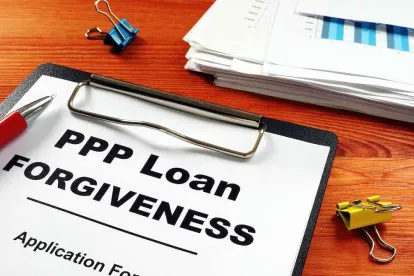On November 18, 2020, the IRS and Treasury Department released Revenue Ruling 2020-27 (the Revenue Ruling) stating that, if a taxpayer received a PPP Loan (defined below) and paid or incurred Eligible Expenses (defined below), the taxpayer may not deduct such expenses in the year paid or incurred if, at the end of the year, the taxpayer has a reasonable expectation that the PPP Loan will be forgiven on the basis of such Eligible Expenses. Revenue Procedure 2020-51 (the Revenue Procedure), released on the same day, describes a safe harbor that would permit a taxpayer to deduct Eligible Expenses if the taxpayer is notified that its request for PPP Loan forgiveness has been denied, or if the taxpayer decides not to seek forgiveness of its PPP Loan, with respect to such Eligible Expenses.
Background
The Paycheck Protection Program (PPP) was enacted at the outset of the COVID-19 pandemic as part of the Coronavirus Aid, Relief, and Economic Security Act (CARES Act). The PPP permits the Small Business Administration (SBA) to guarantee certain loans made to small businesses and independent contractors (PPP Loans), and provides that the principal amount of PPP Loans may be forgiven up to the amount of payroll costs, interest on covered mortgage obligations, covered rent obligation payments, and covered utility expenses, in each case, paid or incurred by the borrower between February 15, 2020 and December 31, 2020 (Eligible Expenses). The amount of PPP Loan forgiveness is not recognized as taxable income by the borrower.
The CARES Act does not address the deductibility of Eligible Expenses. Earlier this year, however, in Notice 2020-32 (the Notice), the IRS and Treasury Department announced that taxpayers are not permitted to deduct Eligible Expenses related to PPP Loan forgiveness. The Notice was intended to prevent taxpayers from claiming a deduction for expenses that were reimbursed through non-taxable PPP Loan forgiveness and thereby receiving a double tax benefit under the CARES Act.
Disallowance of the Deduction for Eligible Expenses
The Revenue Ruling provides that a taxpayer that received a PPP Loan may not deduct Eligible Expenses during the taxable year in which such expenses were paid or incurred if, at the end of the taxable year, the borrower reasonably expects all or a portion of the PPP Loan to be forgiven on the basis of such Eligible Expenses.
Pursuant to the Revenue Ruling, a taxpayer that received a PPP Loan and paid or incurred Eligible Expenses in 2020 has a reasonable expectation of reimbursement of such expenses in the form of PPP Loan forgiveness at the end of 2020, regardless of whether the taxpayer has completed an application for PPP Loan forgiveness or intends to apply for forgiveness in 2021. In either case, a reasonable expectation of reimbursement exists because, according to the Revenue Ruling, the CARES Act and procedures published by the SBA provide taxpayers with clear and readily accessible guidance to apply for and receive PPP Loan forgiveness. Accordingly, a deduction for such Eligible Expenses would be inappropriate under relevant judicial authorities or Section 265(a)(1) of the Internal Revenue Code (relating to nondeductibility of expenses related to tax-exempt income).
Safe Harbor for Claiming Deductions for Eligible Expenses if the PPP Loan is Not Forgiven
The Revenue Procedure provides a safe harbor allowing a taxpayer to claim a deduction for Eligible Expenses if (1) such Eligible Expenses are paid or incurred during the taxpayer’s 2020 taxable year, (2) the taxpayer obtained a PPE Loan which, as of the end of the taxpayer’s 2020 taxable year, the taxpayer expects will be forgiven in a subsequent taxable year, and (3) in a subsequent taxable year, the taxpayer’s request for forgiveness of the PPP Loan is denied, in whole or in part, or the taxpayer decides never to apply for forgiveness of the PPP Loan (the Safe Harbor).
If a taxpayer qualifies for the Safe Harbor, the taxpayer may deduct the relevant Eligible Expenses on the taxpayer’s timely-filed U.S. federal income tax return or information return for the 2020 taxable year or on an amended return or administrative adjustment request for the 2020 taxable year. Such taxpayer also may deduct the relevant Eligible Expenses on a timely-filed U.S. federal income tax return or information return for a subsequent taxable year. A taxpayer notified by its PPP Loan lender in a subsequent taxable year that the forgiveness of all or part of the PPP Loan has been denied may, but is not required to, rely on the Safe Harbor because such Eligible Expenses would be deductible under general tax principles.
To apply the Safe Harbor, a taxpayer must attach a statement to the tax filing on which it deducts the relevant Eligible Expenses. The statement must be titled “Revenue Procedure 2020-51 Statement” and must include, among other items, a statement of the taxpayer’s eligibility for the Safe Harbor, the amount of the PPP Loan for which forgiveness was denied or will not be sought, and the amount of Eligible Expenses deducted on the filing.
The Revenue Procedure is effective for taxable years beginning or ending in 2020.






 />i
/>i

